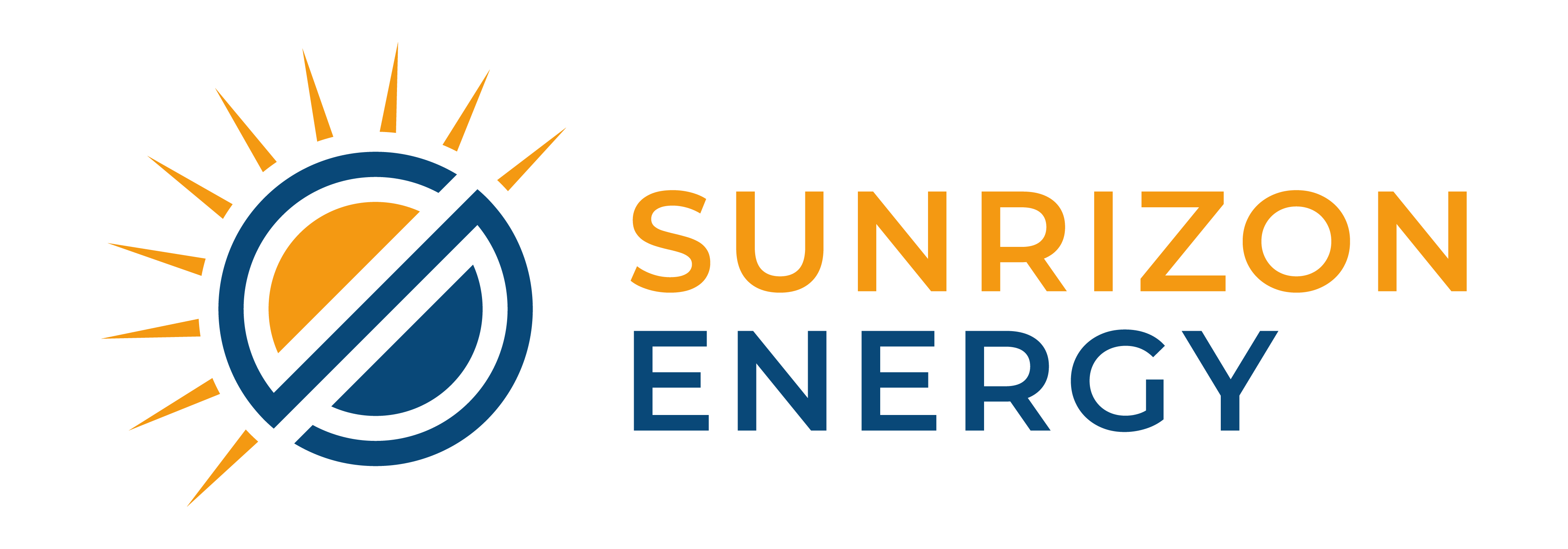Choosing the right solar installer in Texas can make the difference between a system that delivers decades of reliable savings and one that becomes a costly headache. With Texas leading the nation in solar capacity and thousands of installers competing for your business, the selection process has become more complex than ever.
Unfortunately, many Texas homeowners make critical errors during installer selection that lead to poor system performance, financial losses, or safety hazards. Understanding these common mistakes: and how to avoid them: will protect your investment and ensure your solar system delivers the long-term benefits you expect.
Mistake #1: Choosing Based Solely on Price
The biggest trap Texas homeowners fall into is selecting the cheapest bid without evaluating the complete package. Companies offering rock-bottom prices often cut corners by using inferior equipment, employing undertrained workers, or skipping essential components that affect system longevity and performance.
In Texas's competitive solar market, some installers slash prices by using lower-grade panels that degrade faster in our intense heat, or by skimping on crucial components like optimizers and monitoring systems that maximize energy production.
How to Fix It: Compare the entire value proposition rather than focusing solely on upfront costs. Evaluate panel quality, inverter warranties, workmanship guarantees, and post-installation support. A slightly higher initial investment typically results in better long-term returns through improved system performance and fewer maintenance issues. Request detailed equipment specifications and compare manufacturer warranties across different bids.
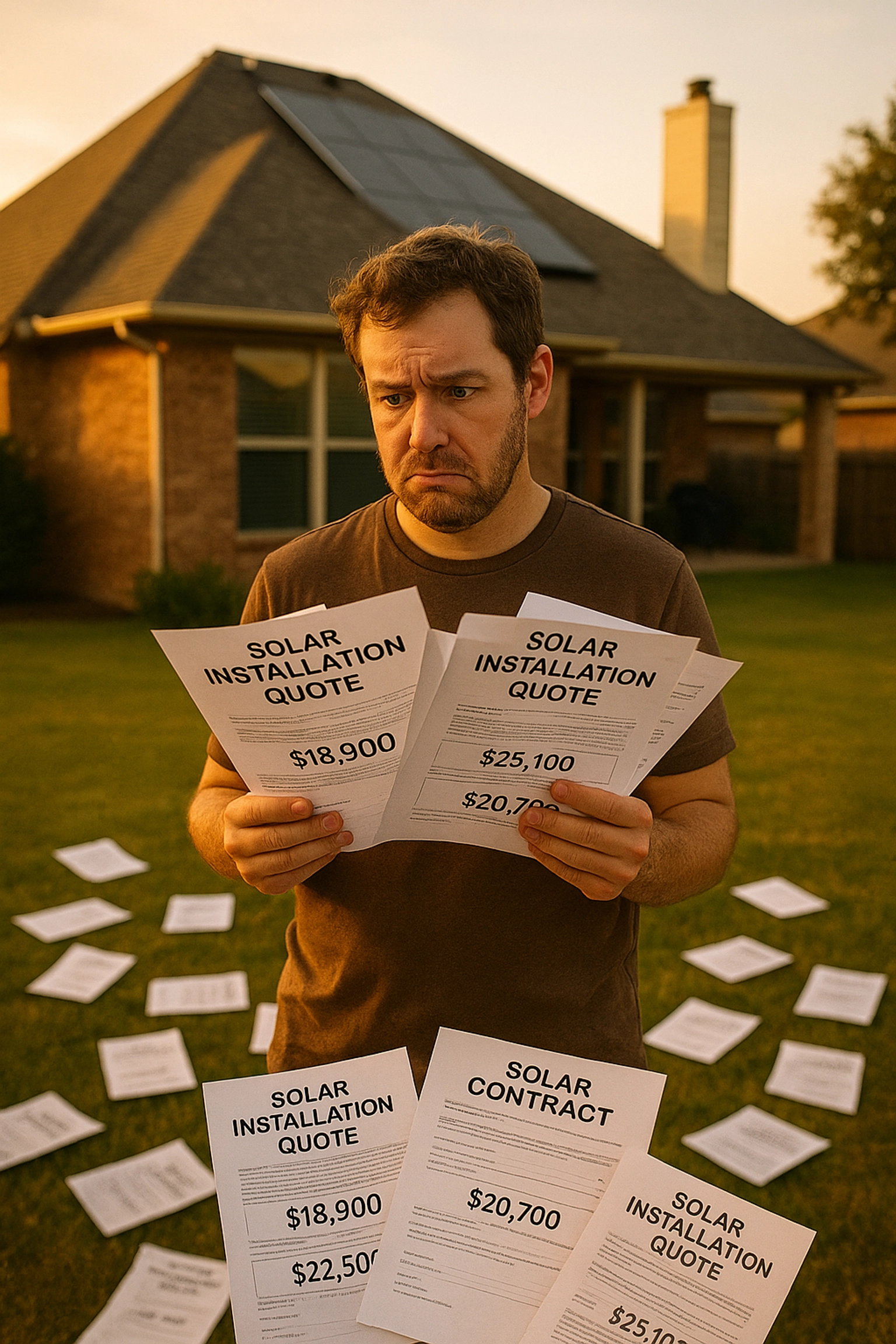
Mistake #2: Hiring Unlicensed or Uncertified Installers
Texas requires electrical contractors performing solar installations to hold proper state licenses, yet some homeowners work with unqualified installers to save money. This creates serious risks since solar installation involves complex electrical work that must comply with state building codes and utility requirements.
Unlicensed contractors may create unsafe conditions, cause failed inspections, or leave you without legal recourse if problems arise. Texas has specific requirements for electrical permits and inspections that only licensed professionals understand fully.
How to Fix It: Verify that your installer holds a Texas electrical contractor license and NABCEP (North American Board of Certified Energy Practitioners) certification. Check their license status through the Texas Department of Licensing and Regulation website. Ensure they carry adequate liability insurance and workers' compensation coverage. These credentials demonstrate professional competency and provide protection for your investment.
Mistake #3: Ignoring Local Texas Experience
Solar regulations, permitting requirements, and utility interconnection rules vary significantly across Texas municipalities and utility territories. National companies without local expertise often struggle with regional requirements, leading to project delays, additional costs, or compliance issues.
Texas has unique considerations including specific structural requirements for high winds, local permit processes that vary by city, and different net metering policies across utility companies like Oncor, CenterPoint, and AEP Texas.
How to Fix It: Choose an installer with proven experience in your specific Texas region who understands local codes, inspection processes, and utility requirements. Ask for references from recent projects in your area and verify their track record with your local utility company. Installers familiar with Texas-specific challenges like extreme weather requirements and local permitting processes will complete your project more efficiently.
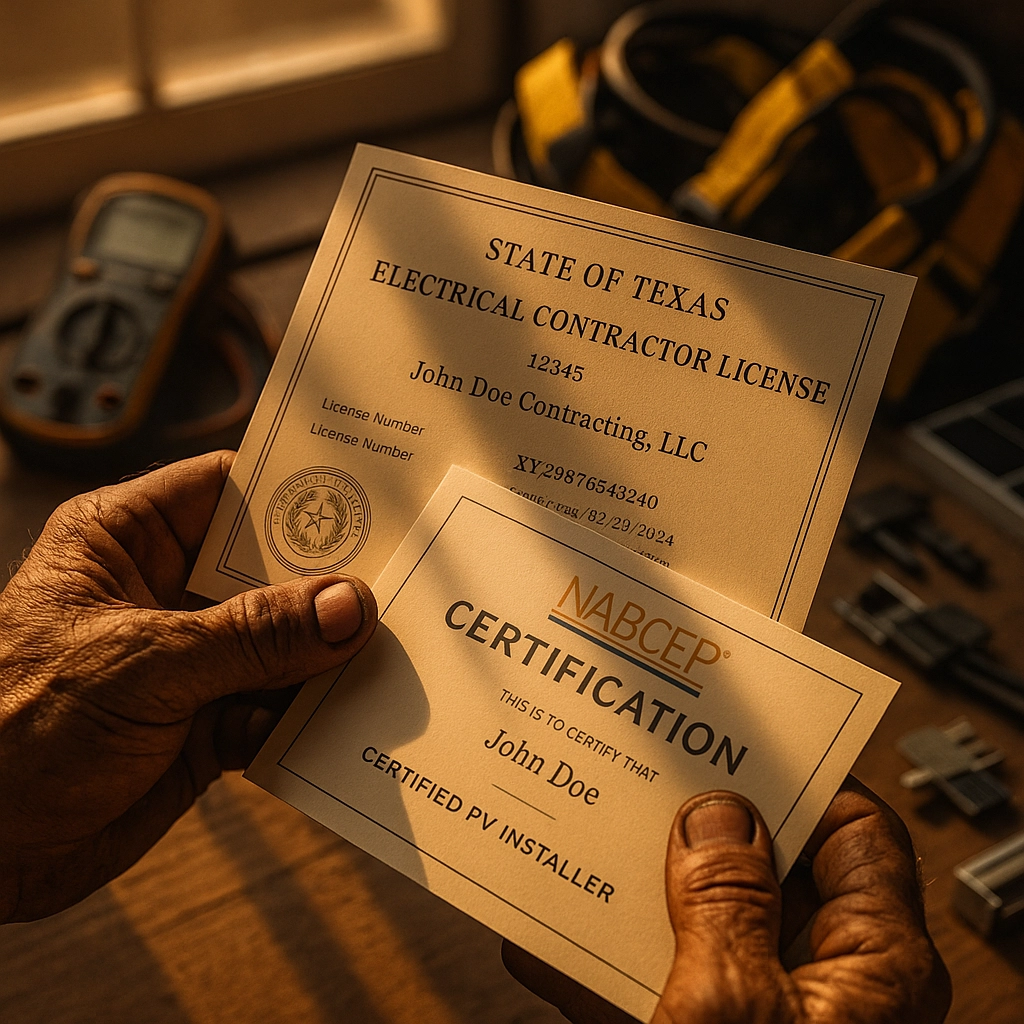
Mistake #4: Attempting DIY Solar Installation
Some Texas homeowners try to save money by installing solar systems themselves, but this approach frequently backfires. DIY installations often result in mismatched components, improperly sized systems, or missing essential safety equipment like rapid shutdown devices required by Texas electrical codes.
Texas's extreme weather conditions require specific installation techniques and equipment ratings that DIY installers typically don't understand. Improper installation can create fire hazards, structural damage, or void your homeowner's insurance coverage.
How to Fix It: Recognize that professional installation is essential for safety, performance, and warranty protection. The cost of fixing DIY mistakes often exceeds potential savings, and improper installation can create serious safety hazards. Professional installers understand Texas building codes, structural requirements for high winds, and proper electrical connections that ensure system safety and longevity.
Mistake #5: Falling for High-Pressure Sales Tactics
Texas's competitive solar market has attracted some companies that use aggressive marketing tactics and too-good-to-be-true offers to pressure homeowners into quick decisions. Door-to-door sales pitches, limited-time offers that expire within hours, or promises of "free solar" should raise immediate red flags.
Some companies make unrealistic claims about savings potential or system performance without properly evaluating your home's specific conditions, energy usage, or shading issues that affect solar production in Texas.
How to Fix It: Take time to research any company thoroughly before signing contracts. Be wary of high-pressure tactics and promises that seem unrealistic. Get multiple detailed quotes and compare them carefully. Legitimate companies will provide written proposals with specific equipment details, production estimates based on your actual roof conditions, and clear explanations of financing terms without pressuring you to sign immediately.
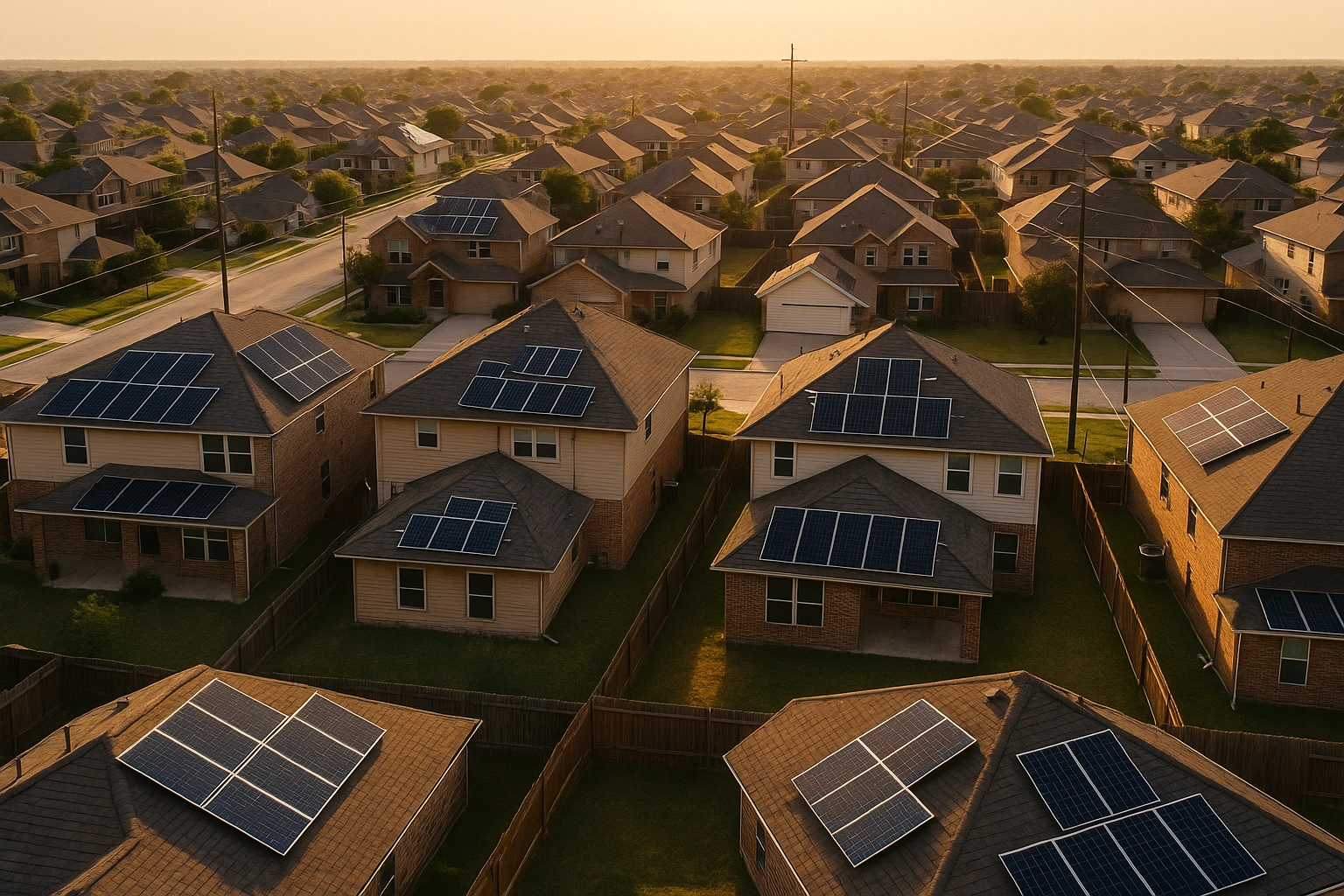
Mistake #6: Not Verifying Installer Credentials and Financial Stability
Many homeowners fail to thoroughly investigate their installer's background, business history, and financial stability. This oversight can leave you stranded if the company goes out of business or refuses to honor warranty claims: a particular concern in Texas where some solar companies have failed during market fluctuations.
Without proper verification, you may discover too late that your installer lacks the experience, insurance coverage, or financial backing to support your system throughout its 25+ year lifespan.
How to Fix It: Research the installer's business history, customer reviews, and financial standing through the Better Business Bureau and online review platforms. Understand exactly what warranties are provided, who backs them, and what steps are required to maintain coverage. Verify that both equipment and workmanship warranties are clearly documented and backed by financially stable companies. Ask about the installer's track record and how long they've been operating in Texas.
Mistake #7: Rushing the Selection Process Without Proper Due Diligence
Solar installation is a significant investment that will affect your Texas home for 25+ years, yet many homeowners make hasty decisions without adequate research. Rushing leads to overlooking critical factors like system sizing based on your actual energy usage, equipment quality suitable for Texas weather conditions, or installer qualifications.
Texas homeowners often underestimate the importance of proper system design that accounts for our intense heat, occasional hail, and high winds that can affect solar panel performance and longevity.
How to Fix It: Take adequate time to educate yourself about solar technology and obtain multiple detailed quotes from qualified installers. Schedule site evaluations with at least three certified companies and ask specific questions about their experience with Texas installations, equipment warranties, and maintenance requirements. Don't sign contracts until you're completely confident in your choice and understand all terms and conditions.
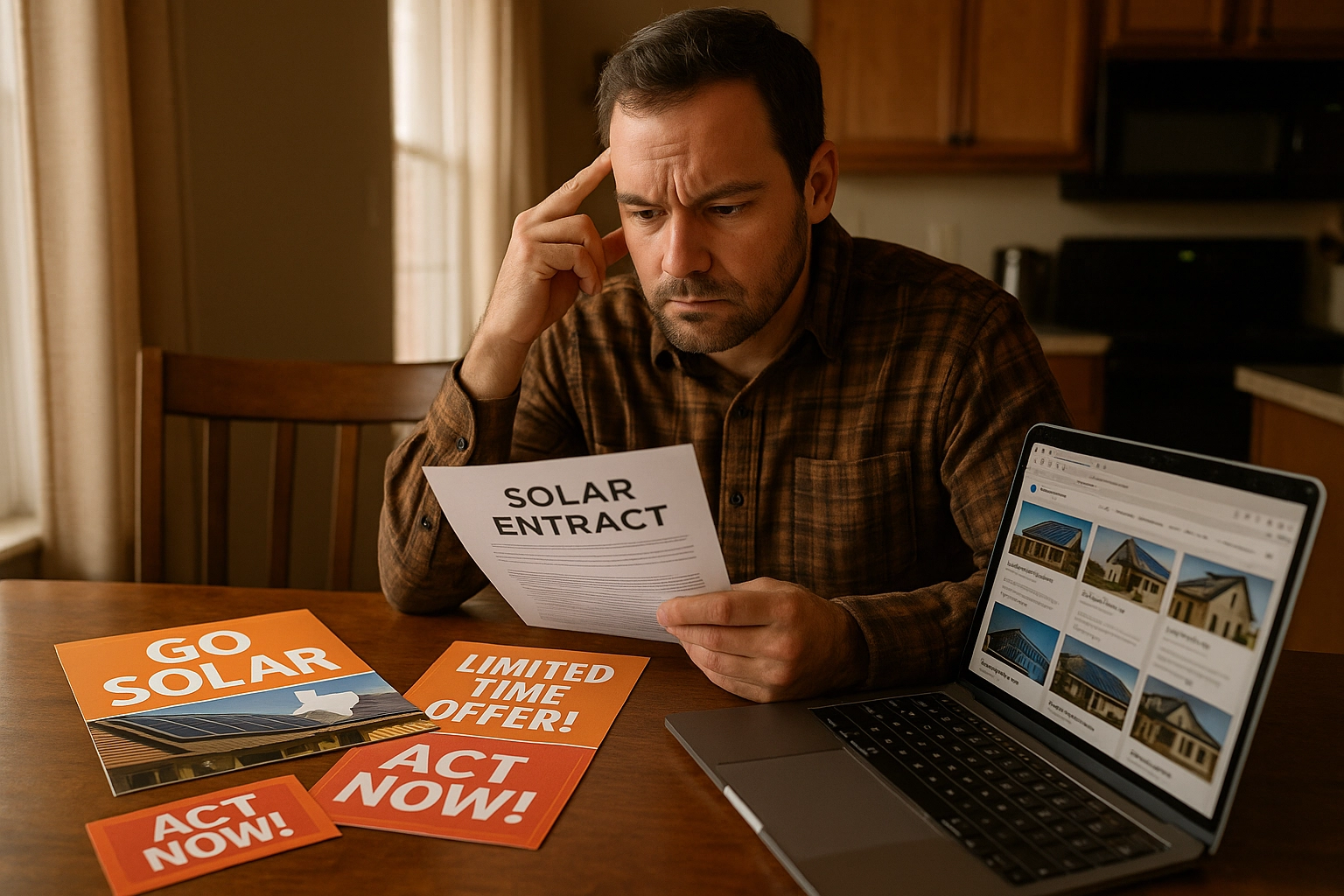
Additional Texas-Specific Considerations
When selecting a solar installer in Texas, consider these additional factors unique to our state:
Weather Resilience: Ensure your installer understands Texas weather requirements and uses equipment rated for high winds and hail resistance. Ask about their experience with storm damage repairs and insurance claim processes.
Utility Interconnection: Different Texas utilities have varying net metering policies and interconnection procedures. Your installer should be familiar with your specific utility's requirements and timeline.
HOA Compliance: Many Texas neighborhoods have HOA restrictions on solar installations. Choose an installer experienced in navigating HOA approval processes and meeting aesthetic requirements.
Making the Right Choice
Avoiding these common mistakes requires thorough research, patience, and careful evaluation of your options. Start by obtaining quotes from multiple licensed, certified installers with strong local reputations in Texas. Compare equipment quality, warranties, financing options, and customer service records rather than focusing solely on price.
Remember that the cheapest option rarely provides the best long-term value, while the most expensive isn't necessarily the best choice either. Focus on finding an installer who demonstrates expertise with Texas installations, transparency in their processes, and commitment to customer satisfaction throughout the entire project lifecycle.
Your solar investment should provide decades of reliable energy production and savings. Taking time to select the right installer protects this investment and ensures your system performs optimally under Texas conditions. The effort you invest in proper installer selection will pay dividends through improved system performance, fewer maintenance issues, and greater peace of mind for years to come.
